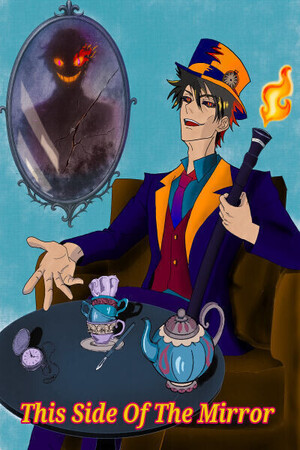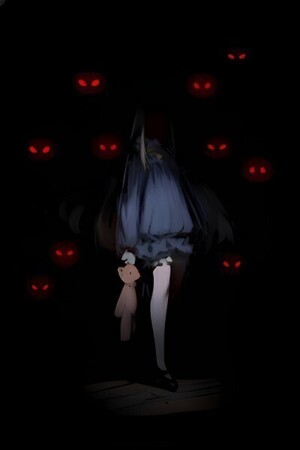Chapter 6:
A Body Remembering It's Name.
This Side Of The Mirror
____________________________________
Humans are a walking contradiction.
Every cell carries a death program—apoptosis, the built-in code for self-destruction.The only reason we’re alive is because other signals keep interrupting it,
like notes scribbled on the margin: not yet.
And here I was.
Contradicting myself.
Drifting on an isolated island.
Helping a woman with a tongue sharper than a scalpel.
Hunting for mice—or so she claimed.
What a joke.
One stitched with anesthesia.
The fog pressed in, damp and clinging.
Dirt stung the air; humidity spread under my skin like rot.
Somewhere, metal clicked—a scalpel or a lighter, I couldn’t tell.
Kagenui walked ahead with surgical precision, her white coat cutting through the gray.
“So,” I murmured, voice steady—too steady.
“We’re not actually looking for a mouse to be your new test subject, are we?”
Her head turned. Emerald eyes locked on me.
Her silence was heavier than the fog.
“Hmm. So your brain hasn’t rotted yet, corpse prince. You’re right. We’re after a clown mouse. Got to return her to the circus before the big show begins.”
She smiled thinly, sarcasm curling at the edge.
“Since you’ve got experience following threads of girls, this should be the perfect job for you.”
The words slid from her lips, clinical as a diagnosis.
“So you know about Emiha,” I pressed. “Her ritual. The sick joke of fate—”
“My dear sister. The obedient one. The perfect blade. The silent doll. Everyone in Wonderland knows her.”
Her voice was steady, detached, like a doctor reciting today’s menu.
“The real diagnosis is what you actually know about your princess. When you meet someone after so long, they never match the reflection in your head.”
I froze for a beat, as if vines had grown from the earth to grip my feet.
And for the first time, I wondered if my lies would hold—like glass under a surgeon’s hand.Kagenui’s voice kept its steady metronome.
“Memory isn’t a vault,” she murmured, tone surgical. “It’s a door with a crooked hinge. Sometimes the hinge jams open, sometimes it slams shut without asking.”
I followed her words the way a surgeon watches a monitor.
The fog pressed in—thick, damp, swallowing every footstep.
It clung to my coat, to my breath, to thought itself.
Senses don’t only recall—they forge. Stitch new patterns over old skin.”
She paused.
The world narrowed around her.
Something under my ribs answered her—an extra beat that wasn’t mine.
A borrowed rhythm, someone tapping a meter inside my chest.
Foreign and intimate at once. A pulse I couldn’t name.
Kagenui’s eyes slid over me like a file being leafed through.
“You don’t trust anything,” she replied. “You clutch memory like driftwood and call it a boat. You confuse the wood with direction.”
I tried to ground myself.
“So am I steering my life… or just stitched into someone else’s tide?”
“You’re a common case. A living corpse. Practices the act of living because rehearsal is easier than feeling. Calls himself ‘in control’ while being tethered by other people’s stitches.”
The fog gripped my ankles like cooling plaster.Moisture pooled on my tongue. Even the air felt sterile.
“You’ve been playing knight for a long time,” she went on, voice soft but cutting. “Saving princesses you glimpsed at the edge of a dream. It’s noble. It’s also child’s play. It tells me you wear fate like a costume—slip it on and pretend the seams don’t show.”Her tone landed like a cold tray on my chest.I forced something like a reply.
“It’s normal to help. If someone is being turned into a killer—”My next step hit the ground a beat late.
The world moved—but slightly out of sync.
Her coat shifted. She snapped her fingers lightly—half mockery, half command.
From her pocket came a folded file, stamped in neat black:
“For the record,” she murmured with a private laugh, “the Organization already knows everything about you. Blood type: O negative. Middle-school fight, fractured rib—age fifteen. Juvenile record—two brawls, one small knife.”
“You left a tidy trail of red, if anyone cared to follow it.”
Heat rose beneath my skin despite the damp.“You people ever heard of privacy?” I scoffed. “You’re saying they’ve already mapped me?”
She shrugged with theatrical grace—one hand raised, palm up, like a doctor mid-lecture.“They dissected you on paper years ago. I’m only reading the autopsy notes for curiosity. Consider me the intern leaving comments in the margins.”
The words sliced deeper than I expected.I felt transparent—laid open, skin folded back, waiting for the next incision.
Kagenui’s gaze hardened.“Readable things are easy to stitch. Predictable things are easy to dress.If you’re careless, Wonderland will swallow you whole—”
She stopped. The fog pulsed faintly, as if breathing.“—and one morning, you’ll wake in a stranger’s skin and wonder why the clothes don’t fit.”
The air hummed. My shadow flickered on the fogged ground, warping—stretching like it no longer recognized me.Her words sat between us like a dropped scalpel.
Trees thinned until their silhouettes curved like ribs.
It felt like walking inside a rib cage.Or worse—like walking toward the stomach.
—-------There was something strange in this place.
Something that clung to the spine like wire.
My skin prickled—like my own blood recognized its kin and wanted to rise to the surface.
Heat gathered under my ribs, faint but alive, as if remembering.
The words escaped my mouth in a whisper—not low enough for Kagenui to ignore.
“The only difference is the meat doesn’t talk.”Of course.
She didn’t miss the chance to cut.
Charming.
Why would anyone wander into a place like this? From what I’d seen so far, only the strangest people called this island home.
Kagenui stopped—tapping a finger to her temple as if diagnosing the thought before releasing it.“She has a habit of falling asleep wherever she pleases. Hallways. Operating rooms. Once, I found her inside a morgue freezer.”
Her tone was serious.Too serious for words that absurd.
A cold wind blew, and I flinched—not in my body, but deeper.Shapes emerged through the fog: gravestones, faintly etched against the cliffside. The faint crash of waves echoed below.
The air turned heavy—sweet rot, like flowers that forgot they’d died.
And then came the pulse of wrongness—quiet, but certain.
Like something beneath the graves was breathing with us.
It felt… familiar. Wrongly familiar.
Like a fragment of a dream stitched into me—not mine, but still pulsing in my marrow.
My steps carried me forward before I realized it.
“What is it? Homesick, corpse prince?” Kagenui teased.
But I kept moving, marionette-like—dragged by an old wound remembering its stitches.Through the graves, I heard it: faint, fragile.
A lullaby.
heart syncing with each trembling note,
through the ghosts buried for eternity.
A small girl in an oversized coat, sprawled in the grass before a gravestone.
A music box rattled beside her, its notes trembling.
She lay on her stomach, face half-hidden.
Fragile. Peaceful, almost.
But the kind of peace glass has before it shatters.
Kagenui’s heels clicked closer. She tapped her toe against a gravestone, amused.
“You actually found her. Natural, aren’t you, when it comes to following girls?”
“This little mouse… dreaming while hunters circle.”
Then she leaned down, lips parting with a hum.A lullaby threaded through the graveyard.
Smooth. Beautiful.
And… nostalgic.
“…Doctor… is it time to work already?”
Her voice was faint, ready to crumble like a dream at dawn.She pushed herself upright.
Her coat shifted.
The front gleamed wet.
Blood—fresh, bright, dripping slow.
No wound underneath.
It had chosen her, not claimed her.
“Didn’t I tell you to report back after missions?”
She completely ignored the blood—like it was a uniform thing in this place.
Dormouse stared blankly, as if weighing whether to answer…or whether she had fallen asleep with her eyes still open.
Her head tilted lazily. The words fell like drifting snow.
I couldn’t keep up with the rhythm of this place.I sighed and tilted my head to the sky.
Night had arrived. Silence thickened.
A beat.
A tick—
It came from a massive clocktower near us—its hands rusted, its frame devoured by fog.
Yet the toll wasn’t struck.
It was exhaled.
Each chime tightened around my ribs—precise, surgical,
like someone sewing me closed from the inside.
“We’re lucky,” she said lightly. “Found our mouse before curtain call.”
“Curtain—? What curtain?”
My voice cracked, threads unraveling under the sound.
“The White Court begins,” she declared, voice clean as a scalpel.
“Every actor must stand in their role—even the corpse who hasn’t chosen his part yet.”
One last chime.
Like applause from something unseen.
____________________________________
Kagame Jin's commentary:
The scalpel dissects more than flesh — she dissects the idea of memory itself.
Hiiro walks through fog thinking he’s chasing a mouse, but what he finds is the anatomy of his own reflection.
Every word she says cuts like surgery: clean, measured, and unflinchingly true.
Hope you enjoyed that interaction between our corpes and scalpel. If you found a reflection that felt too close to you , consider leaving a like or comment of your thoughts on the story so far.




Please sign in to leave a comment.